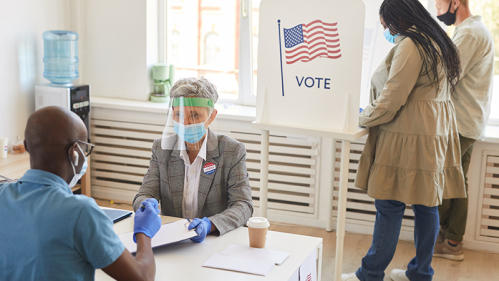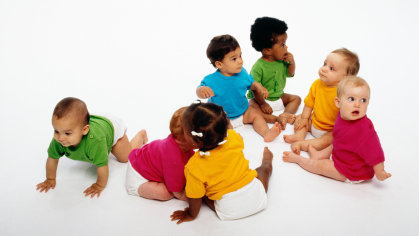Rutgers Experts Discuss Staying Safe, Managing Stress around Elections amid COVID-19

Many people are experiencing heightened stress and anxiety due to fear of unrest post-elections
As COVID-19 cases continue to rise nationwide and as Americans head to the polls to elect the next president, many are worried about staying safe while experiencing increased anxiety due to uncertainty about political unrest.
Rutgers infectious disease expert David Cennimo, an assistant professor at the Rutgers New Jersey Medical School, and Petros Levounis, a professor and chair of the Department of Psychiatry at Rutgers NJMS and chief of Service at University Hospital, share tips on how to stay safe at the polls and maintaining your mental health during and after the election.
What safety precautions should people take if voting in-person?
Cennimo: If you decide to vote in-person, you should wear a mask. If you suspect you'd be waiting in line for a while and are worried about social distancing, you should also wear a face shield or some form of eye protection for extra caution.
Additionally, I've seen some people in lines with masks around their chins while drinking coffee, beverages or water. This is not considered protection and can put you at risk. Finally, plan to use hand sanitizers before and after the actual voting in the booth.
Has the pandemic worsened anxiety during this year's elections?
Levounis: All elections provoke anxiety and this year's presidential elections is no exception. But with an infectious virus among us, it has probably made this election one of the most anxiety-provoking in recent years. The pandemic has robbed us of some of the best strategies to help us cope with stress and anxiety. For example;
- It is now much harder to get together and speculate, celebrate or commiserate about the election with friends.
- We're unable to go to the movie, theater, clubs, parties or even going out to eat.
- Dating, relationships and sex, which also help, have dwindled among many people.
Perhaps one of the pandemic's most sinister effects has been the inability to see each other's faces the way we used to during a heated election week. When we need a sense of community the most, precisely at the time when we'd like to be reminded of our humanity and collective struggles, hopes and fears, we're unable to even smile at one another at this time. We walk the same streets but cannot offer the reassuring facial expressions that let our fellow citizens know that we are all in it together, no matter whom we support for president.
How can people deal with election anxiety during and after the elections?
Levounis: We can try to preserve our routines even in times of high uncertainty and anxiety. Stick to your exercise schedule, your weekend romance, daily crossword puzzle or other pleasurable activities that give structure to your life.
Take charge of what you can control in the election like supporting your candidate by going out to vote. You can advocate, donate or volunteer. Then, let the proverbial chips fall where they may and know you did the best you could.
Connect safely with others at all costs to feel a sense of community. Try not to be so quick to write off virtual happy hours, virtual get-togethers or virtual election-night parties. Doing something is certainly better than doing nothing.


